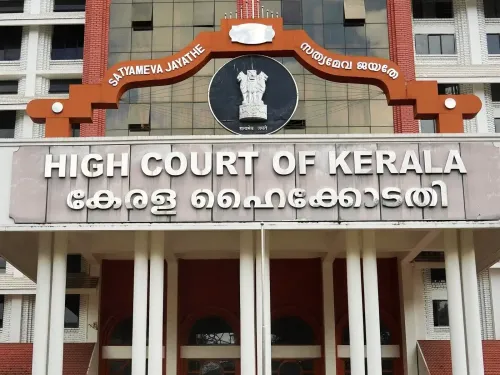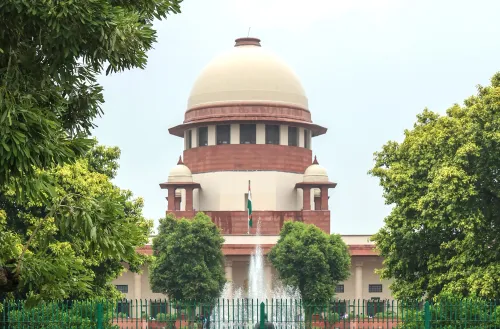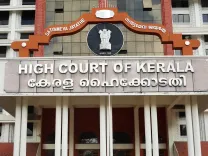Should the Supreme Court Expedite the Finality of the Waqf Amendment Act?

Synopsis
Key Takeaways
- Asaduddin Owaisi calls for expedited Supreme Court hearings on the Waqf Amendment Act.
- The Act’s provisions may impact the management of Waqf properties.
- Concerns about the BJP’s influence on Waqf governance have been voiced.
- The Supreme Court's interim order allows for ongoing deliberations.
- Debates on property donation eligibility are ongoing.
Hyderabad, Sep 15 (NationPress) The President of the All India Majlis-e-Ittehadul Muslimeen (AIMIM), Asaduddin Owaisi, expressed his desire on Monday for the Supreme Court to swiftly reach a decision regarding the finality of the Waqf Amendment Act, 2025.
In response to the interim ruling from the Supreme Court, the Hyderabad MP noted that the apex court has not imposed a complete stay on certain provisions of the Waqf Act.
Reaffirming his claim that the Bharatiya Janata Party (BJP) aims to undermine Waqf properties across the nation, Owaisi urged the Supreme Court to initiate prompt hearings to settle the Act's finality.
"This is merely an interim directive. We hope the Supreme Court will commence hearings to issue its conclusive verdict on the Act. This Act fails to protect Waqf properties and instead rewards encroachers. Development of Waqf properties will be stifled," Owaisi stated to the press.
The AIMIM Chief expressed concern that despite the Supreme Court's interim order, the BJP would continue its efforts to weaken the Waqf structure within the country.
"The BJP's perspective is clear: they want to eliminate Waqf properties in India. The entire nation has heard them question the existence of Waqf, labeling it as an alien concept," he remarked.
Regarding the Supreme Court's instruction that a Muslim should ideally be appointed as the CEO of the Waqf Board, the Hyderabad MP added that the Union government might claim it couldn't find a qualified Muslim candidate.
"A party that does not nominate a Muslim for an MP ticket and lacks Muslim representation in Parliament—will it appoint a Muslim officer?" he questioned.
Owaisi argued that appointing non-Muslims to the Waqf Board would violate Article 26 of the Constitution.
He posed the question of whether a non-Sikh could be appointed to the Shiromani Gurdwara Parbandhak Committee or if a non-Hindu could serve on Hindu Endowment bodies.
He also expressed fears that elections for state Waqf Boards would be bypassed under various categories like MPs, MLAs, and custodians, allowing the BJP to install its own members.
Owaisi pointed out that the Supreme Court has not fully stayed the provision requiring a person to be a practicing Muslim for five years to establish a Waqf.
"The Supreme Court indicated that this cannot be enforced until rules are established to verify whether an individual has practiced Islam for five years. They will likely frame these rules soon," he remarked.
He challenged BJP authorities to disclose data on who has donated Waqf properties post-conversion.
"No law forbids individuals of one religion from donating to another. According to Article 300 of the Constitution, I can donate my property to anyone. So why is this provision being created for followers of one religion?" he queried.
Owaisi noted that the Supreme Court has also not entirely put a stay on the provision for Waqf property surveys by District Collectors.
He added that previously, surveys were conducted by the independent Survey Commissioner, who ranks higher than the Collector.
The MP highlighted that only seven states have conducted Waqf property surveys.
He warned that encroachers could be recognized as owners by utilizing the Limitation Act.
The Supreme Court did not stay Section 3D of the Waqf Amendment Act, which nullifies any declaration of protected monuments or areas as Waqf properties.
Owaisi stated that this would effectively transfer ownership of protected monuments, which are Waqf properties, to the Archaeological Survey of India.
He noted that evacuee properties, classified as Waqf properties, would also be transferred to government ownership.
He mentioned that regions like Western Uttar Pradesh, Punjab, and Haryana have many such properties.
The Hyderabad MP, who is among the petitioners contesting the constitutional validity of the Waqf Amendment Act, indicated that they would present all arguments to the bench when the Supreme Court begins its hearings for a final ruling.









